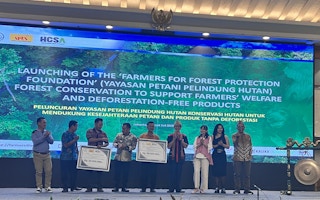Indonesia’s smallholder union (SKPS) has established a foundation to help farmers comply with new regulations that aim to weed deforestation out of global supply chains.
To continue reading, subscribe to Eco‑Business.
There's something for everyone. We offer a range of subscription plans.
- Access our stories and receive our Insights Weekly newsletter with the free EB Member plan.
- Unlock unlimited access to our content and archive with EB Circle.
- Publish your content with EB Premium.
The Farmers For Forest Protection Foundation (4F), announced at an event in Jakarta on Tuesday (1 August), was developed to support forest conservation and responsible deforestation-free practices that improve the welfare of smallholder farmers and rural communities.
Mansuetus Alsy Hanu, secretary-general of SKPS, said that the launch of the foundation was timely as oil palm smallholders need support to cultivate their crops while protecting forests.
Smallholders have expressed concern that they will be unable to meet the requirements of the newly introduced European Union Deforestation Regulation (EUDR), which requires farmers to provide evidence that their crop was grown without cutting forests.
The foundation will provide both monetary and non-monetary support to farmers, including how to follow deforestation-free and sustainable best practices. These include establishing traceability of farmers’ products, recognition of customary forests, and the processing and marketing of non-timber forest products.
Farmers can receive conditional or unconditional funding through the foundation. Conditional funds may be tied to specific areas, farmers, or supply chains with specific targets, whereas unconditional funds are not tied to specific conditions.
Aida Greenbury, board member of 4F, said that sources of funding for the foundation include private and government donors, commodity supply chain partners, associations and members of the public.
4F will also support Indonesian farmers in meeting the no-deforestation requirements in the newly announced EUDR.
Approved by the EU Council on 16 May, EUDR sets the end of 2024 as a deadline to halt all imports and exports of products associated with deforestation at any point in their supply chain.
“This includes proving no-deforestation and forest conservation, geolocation, proof of traceability, implementation of free, prior and improved consent, fair treatment, and investment and capacity building in smallholder communities,” Greenbury said.












